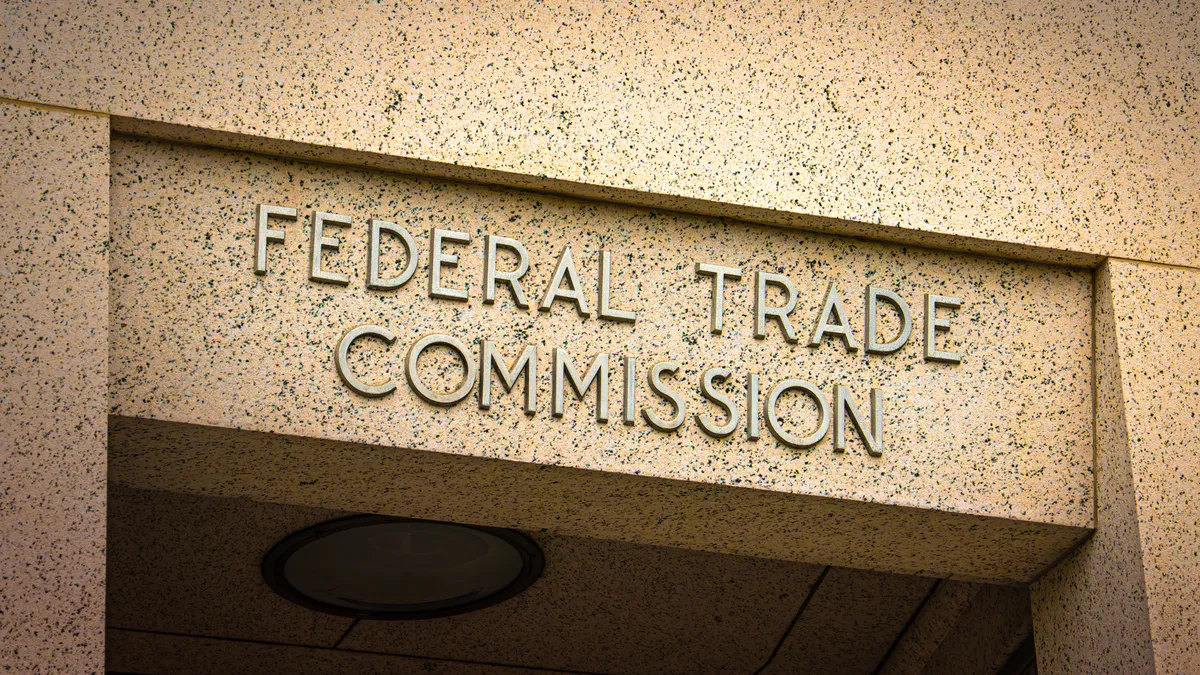Dive Brief:
- President-elect Donald Trump chose FTC Commissioner Andrew Ferguson as the agency’s next chairman, succeeding Lina Khan, and Mark Meador, a longtime Washington insider and antitrust specialist, to fill Ferguson’s current position. Both are longtime members of the conservative legal establishment, with Ferguson drawing headlines recently for announcing he would oppose any FTC policy efforts before Trump’s term begins.
- Ferguson is a former solicitor general for Virginia and previously worked as staff counsel for Sen. Mitch McConnell, the former Senate Republican leader. Earlier in his career, Ferguson clerked for Supreme Court Justice Clarence Thomas. Meador, a partner at Kressin Meador Powers in Washington, has worked as an FTC and DOJ antitrust attorney and former advisor to Sen. Mike Lee, a Utah Republican.
- The commission is widely expected to adopt a less aggressive regulatory approach than during Khan’s tenure. Earlier this month, Ferguson said the FTC should investigate online platforms “for banning users and censoring content,” which Trump noted Tuesday in his social media post, writing that Ferguson has “a proven record of standing up to Big Tech censorship.”
Dive Insight:
One of Ferguson’s priorities under Trump is likely to be revisiting controversial merger guidelines the FTC and Justice Department announced a year ago.
Under the policy, the agencies elevated labor market effects as an element in assessing proposed transactions, with critics complaining that antitrust regulators were adopting the presumption that all consolidation is harmful.
Another area of interest for Trump, and Ferguson, will be in policing large technology companies such as Google, Meta, Amazon and Apple.
The choice of Ferguson and Meador signal that the FTC “will actively enforce the antitrust laws, particularly in the tech industry,” Neely Agin, head of antitrust and competition with Norton Rose Fulbright, said in an email to Legal Dive. “While pro-enforcement, both picks also signal that enforcement will be more business-friendly and focused on traditional theories of harm than the authorities have been during the Biden years.”
One of Trump’s chief complaints has been that tech companies constrict conservatives’ online expression. Ferguson pointedly and favorably noted in a Dec. 2 concurring statement X’s changes to speech moderation since 2022 when billionaire Elon Musk acquired the former Twitter.
“At the FTC, we will end Big Tech’s vendetta against competition and free speech,” Ferguson wrote Tuesday on his X social account. “We will make sure that America is the world’s technological leader and the best place for innovators to bring new ideas to life.”
Outside of the technology industry, “the new commissioners will likely continue to support traditional horizontal merger reviews and investigations in other industries (such as healthcare), but with a greater receptiveness toward finding workable resolutions, such as divestiture remedies” to approve proposed deals, said Arindam Kar, an antitrust attorney with Polsinelli. The FTC will likely decrease its scrutiny of private equity firms but continue its probe of pharmacy benefit managers, Kar said in an email.
The FTC sued three of the largest pharmacy insurers in September.
While the FTC’s enforcement scope and vigor may lessen from Biden’s term, Ferguson and Meador have both spoken in favor of robust action by regulators. Meador, for example, has expressed interest in reforming antitrust enforcement.
“What’s different now is that we’re in the middle of a paradigm shift among Republicans and conservatives with respect to the proper role and use of government power,” Meador said in 2022 at a George Mason University antitrust symposium. “Many on the right are reaching the conclusion that concentrated economic power is just as dangerous as concentrated political power.”
“The growing consensus on the right is that while consumer welfare remains the only appropriate lens for assessing whether conduct is anticompetitive, the application of that standard has been needlessly constricted,” Meador said.
Antitrust regulation has been consumed by “the economic extravaganza” of various economic and efficiency tests to determine how consumers would fare under a combination, Meador said in his comments, quoting former U.S. Court of Appeals Judge Robert Bork.
Trump’s FTC selections came the same day the agency marked a major antitrust win, when a federal judge blocked the merger of Kroger and Albertsons. The latter subsequently terminated the deal on Wednesday, and sued Kroger.
“This historic win protects millions of Americans across the country from higher prices for essential groceries—from milk, to bread, to eggs—ultimately allowing consumers to keep more money in their pockets,” FTC Bureau of Competition Director Henry Liu said Tuesday in a press release.
Melissa Holyoak, a current Republican FTC commissioner, congratulated Ferguson and Meador with posts Tuesday on her X social account, the former Twitter.
The FTC structure allows for a 3-2 partisan split of commissioners, with the president’s party controlling a majority of the seats. Democrats Rebecca Kelly Slaughter and Alvaro Bedoya are also on the commission. Khan’s term expired in September.
Editor’s note: This article has been updated with comments from Arindam Kar, an antitrust attorney with Polsinelli, that were provided to Legal Dive after publication.














